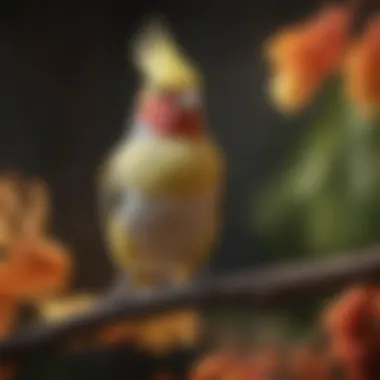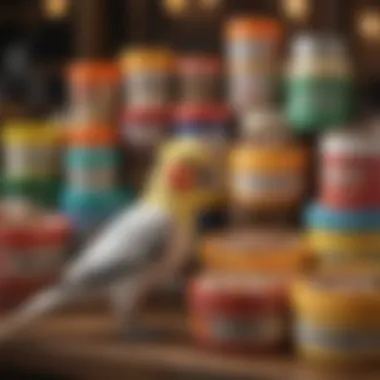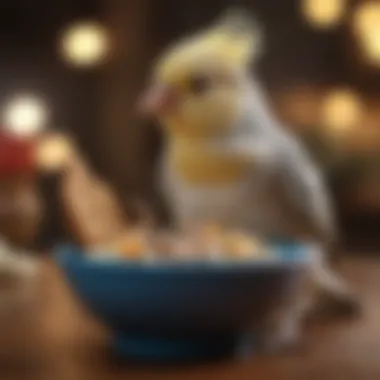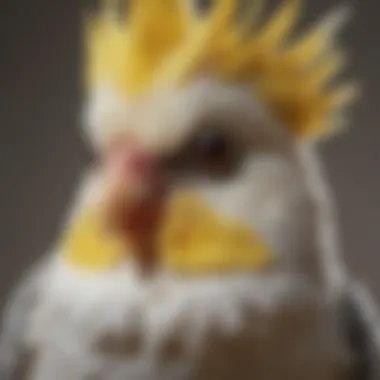Understanding Cockatiel Supplements: A Comprehensive Guide


Intro
Understanding the health of cockatiels begins with recognizing the unique nutritional needs of these lively birds. Cockatiels are popular pets known for their charm and social behavior, but they require a carefully curated diet to thrive. The right supplements can play a crucial role in preventing deficiencies that affect their health and longevity.
In this guide, we will examine the different types of supplements available for cockatiels, discuss dosage recommendations, and consider important safety factors. Additionally, we will explore the latest research in avian nutrition, providing valuable insights for pet owners.
Understanding Your Pet
Pet Behavior Basics
Cockatiels are intelligent birds, displaying a wide range of behaviors. They often engage in vocalizations, mimicry, and social interactions. Understanding their natural tendencies helps owners provide a suitable environment that fosters well-being. Awareness of these behaviors can guide owners in their approach to care and dietary needs.
Common Breed Characteristics
Cockatiels can exhibit variations in feather patterns, colors, and personalities. While they all belong to the same species, factors such as age and genetics can play a role in individual characteristics. This understanding enables owners to tailor their care to the specific needs of their birds, including dietary preferences that may arise.
Species-Specific Needs
Nutrition is critical for cockatiels, who require a balanced diet rich in vitamins, minerals, and protein. Each cockatiel might have unique dietary requirements based on factors such as age, size, and activity levels. By addressing these species-specific needs, owners can significantly improve their cockatiels' quality of life.
Health and Wellness
Routine Vet Check-ups
Regular veterinarian visits are essential in maintaining the health of a cockatiel. These check-ups allow for early detection of potential health issues and ongoing assessment of the bird's diet and nutritional needs. A veterinarian familiar with avian care can provide specific supplement recommendations tailored to the pet's condition.
Vaccination Needs
Vaccination is critical for preventing common diseases that can affect cockatiels. Owners should consult their vets regarding the necessary vaccinations and the appropriate schedule. A well-vaccinated bird is less vulnerable to diseases that could impact its nutritional needs and overall well-being.
Recognizing Signs of Illness
Knowing how to recognize signs of illness is crucial in avian care. If a cockatiel shows changes in behavior, appetite, or appearance, it may require immediate attention. Understanding these signals can help in making timely decisions about diet adjustments or the introduction of certain supplements.
Key Takeaway: Regular checks and prompt attention to health changes are vital for ensuring your cockatiel's well-being.
Enrichment and Activities
Indoor vs.
Outdoor Activities
Providing both indoor and outdoor activities can enhance a cockatiel's physical and mental stimulation. Birds need space to fly, climb, and play. Many owners find that rotating environments and activities helps keep their cockatiels engaged.
Interactive Toys and Games
Interactive toys not only amuse cockatiels but also encourage natural behaviors. Toys that involve problem-solving or require the bird to manipulate objects can promote cognitive development while providing exercise.
Socialization Opportunities
Cockatiels are social creatures that thrive on interaction. Regular engagement with their owners and exposure to well-socialized birds can positively impact their health and happiness. Strategies such as allowing playdates or supervised social hours can be beneficial.
By considering these aspects of cockatiel care, owners can better understand how supplements fit into the broader context of their pets' health and happiness.
Prelims to Cockatiel Care
Cockatiels are delicate yet vibrant creatures, requiring careful attention to their dietary routines. Ensuring their airways are clear and their social needs are met is just the beginning. The focus must also be placed on nutritional requirements that are vital for their well-being. With appropriate care, cockatiels can live up to 20 years and longer. However, their longevity is significantly affected by the quality of their diet.
Understanding Cockatiels and Their Dietary Needs
Cockatiels are omnivorous birds, which means they consume a variety of foods. In captivity, their primary diet should consist of high-quality pellets supplemented with fresh fruits and vegetables. Each of these components plays a distinct role in providing essential nutrients.


Vitamin A is crucial for maintaining good eyesight and healthy skin. Likewise, calcium is key for strong bones and egg production in females. Fresh greens, such as spinach and kale, can help meet these needs. Moreover, protein is important for their growth and energy. This can be sourced from seeds, insects, and legumes. Owners should aim for a balanced proportion between these foods to cover the essential nutrient spectrum.
Without proper nourishment, cockatiels risk developing deficiencies that can lead to serious health issues. Therefore, understanding the dietary needs allows owners to provide a well-rounded intake, maximizing health and happiness.
Why Supplements Are Important
Supplements serve a vital purpose in enhancing the primary diet of cockatiels. As these birds have unique nutritional requirements, there may be times when their diet lacks certain essential elements. This often occurs when fresh foods are limited due to availability or seasonal changes.
The addition of supplements can thus help fill these gaps. For instance, vitamin D3 is often underrepresented in seed-based diets. By integrating a vitamin D supplement, owners can help their birds absorb calcium more effectively, promoting stronger bones.
According to a study published by the Journal of Avian Medicine and Surgery, many pet birds do not receive the necessary levels of certain vitamins through diet alone. Thus, focusing on the proper use of supplements is essential for avoiding deficiencies. It ensures overall health improvement and longevity, reducing the risk of illness.
**“A tailored approach to feeding cockatiels can significantly enhance their life quality.
Types of Cockatiel Supplements
The role of supplements in the diet of cockatiels cannot be overstated. Cockatiels, like all pet birds, require a balanced mix of nutrients to support their health, vitality, and longevity. Various types of supplements cater to different nutritional needs, which can greatly enhance the well-being of these charming avians. Proper supplementation can help prevent deficiencies that lead to health issues. By understanding the specific types of supplements available, owners can make informed choices to better the lives of their cockatiels.
Vitamins and Minerals
Vitamins and minerals form the cornerstone of a cockatiel's dietary regimen. Essential vitamins such as A, D, E, and various B vitamins play crucial roles in maintaining the bird's health. They support development, boost the immune system, and promote good feather quality. For instance, Vitamin A is significant for eye health and tissue maintenance. Mineral supplementation also cannot be neglected; calcium and phosphorus are pivotal for strong bones and overall bodily functions. A deficit in these nutrients can lead to serious problems such as metabolic bone disease. Evaluating the dietary intake of these vitamins and minerals helps in determining if additional supplementation is needed.
Amino Acids
Amino acids are often the unsung heroes in bird nutrition. These organic compounds are the building blocks of proteins, which are vital for growth, repair, and maintenance of body tissues. Cockatiels, like other birds, require a variety of amino acids for optimal health. While some can be produced naturally, others, known as essential amino acids, must come from dietary sources. Supplements can provide these necessary amino acids, especially if the primary diet is lacking in protein-rich foods. Attending to the amino acid profile in the diet ensures that the cockatiel can grow, develop, and stay active.
Probiotics
Probiotics play a significant role in maintaining gut health in cockatiels. These beneficial bacteria help in digestion and nutrient absorption, effectively enhancing overall health. A well-balanced gut flora can prevent gastrointestinal diseases and support a strong immune system. Many cockatiels may experience gut imbalances due to stress, changes in diet, or illness. Introducing a quality probiotic supplement can help restore this balance. Regular use of probiotics ensures that the bird's digestive system functions well, which is essential for overall well-being.
Herbal Supplements
Herbal supplements can provide a natural aid to enhance the health of cockatiels. Ingredients like echinacea, milk thistle, and ginseng offer benefits that range from boosting immunity to aiding in liver function. Herbal solutions can invigorate and support an avian's health without relying solely on synthetic options. It is important, however, to research and understand the appropriate herbs for cockatiels, since not all herbs are safe for bird consumption. Furthermore, consulting with a veterinarian experienced in avian care can help ensure safe and beneficial usage.
Overall, each type of supplement plays a vital role in meeting the specific nutritional needs of cockatiels. Understanding these supplements helps owners optimize their birds' diets and promote healthy, sustained living.
Choosing the Right Supplements for Your Cockatiel
Choosing the right supplements for your cockatiel is crucial in ensuring their vitality and longevity. Proper nutrition is the foundation for a healthy bird. Supplements complement a cockatiel's diet and fill in any gaps that may arise due to dietary limitations or deficiencies. By understanding the specific needs of your bird, you can make informed choices that will enhance their quality of life.
Assessing Nutritional Needs
Before selecting supplements, it is essential to assess the nutritional needs of your cockatiel. A balanced diet typically includes seeds, pellets, vegetables, and occasional fruits. However, each cockatiel is different, and factors such as age, health, and activity levels can influence their nutritional requirements.
- Age and Stage of Life: Young, developing cockatiels may need different nutrients compared to mature birds. Older birds may also require supplements to support aging joints and overall health.
- Health Issues: Cockatiels with specific health concerns, such as feather plucking or respiratory issues, might benefit from targeted supplements.
Regularly observing your cockatiel's behavior, feathers, and energy levels can provide valuable insight into their health. A bird that appears lethargic or has dull feathers may indicate a nutritional deficiency. Keeping a journal of diet and health changes can also be helpful in assessing their needs.
Consulting with Veterinarians
Consulting with a veterinarian is an indispensable step when it comes to choosing the right supplements. A vet, especially one familiar with avian species, can guide you in selecting specific supplements based on your cockatiel's unique needs.
- Expert Recommendations: Vets have the knowledge to recommend quality products and dosages tailored to your bird's nutritional requirements.
- Health Checks: Regular check-ups can help identify underlying health issues that may need to be addressed with specific supplements.
- Avoiding Over-supplementation: A vet can help ensure that you do not over-supplement, as this can lead to toxicity and other health problems.
In summary, a bird's diet is not just about what you feed them daily, but also about ensuring that they receive all necessary nutrients. Understanding their specific needs and consulting with a veterinarian can significantly impact your cockatiel's well-being.
Dosage and Administration of Supplements
When discussing cockatiel supplements, the dosage and administration play a pivotal role. Getting it right can significantly affect your cockatiel's health and well-being. Understanding how much and how often to give these supplements not only ensures they receive the necessary nutrients but also prevents possible overdoses or deficiencies.
Recommended Dosages
Correct dosages of supplements can vary depending on several factors, including the specific product, age, and health status of your cockatiel. Generally speaking, supplement dosages should align with the manufacturer's guidelines or recommendations from a qualified avian veterinarian. Common guidelines include:


- Vitamins: A well-balanced vitamin powder can be added to the food, usually one pinch per meal.
- Minerals: Mineral supplements might require about 1/4 teaspoon per bird, sprinkled onto fresh food.
- Probiotics: These usually come in powdered form and can be given in small amounts, typically suggested at around 1/8 teaspoon daily.
It is essential to monitor your cockatiel’s response to any supplement. If unclear, consult an avian vet to adjust doses accordingly. The goal is to find a personalized approach that suits your bird’s specific needs.
Administration Methods
Administering supplements to cockatiels can be done in several effective ways, depending on the type of supplement and what works best for your bird. Common methods include:
- Mixing with Food: One of the simplest methods is to mix powdered supplements into your cockatiel's regular food. This is effective, but you should ensure that the bird consumes all the food to get the required dosage.
- Water Soluble Supplements: Some supplements come in liquid form. These can be added to fresh drinking water. It is critical to change the water daily to avoid bacterial growth, and ensure your bird drinks enough to receive the full dosage.
- Direct Administration: For birds that are reluctant to consume supplements mixed in food or water, direct administration might be necessary. This can be done using a syringe, but caution is required to avoid aspiration.
Always ensure that your cockatiel feels comfortable with the method you choose for supplement administration.
By understanding both dosage and administration methods, you can effectively enhance your cockatiel’s health and happiness. Monitoring how your bird reacts to these supplements will also provide valuable insight into their nutritional needs.
Safety Considerations
Safety considerations are crucial for the well-being of your cockatiel. Choosing the right supplements is not only about enhancing their nutrition but also ensuring their safety. This section addresses critical elements that every cockatiel owner should understand to prevent harm and promote health through supplements.
Identifying Toxic Ingredients
When selecting supplements for your cockatiel, it is essential to know which ingredients can be harmful. Some common toxic ingredients might not be obvious at first glance.
- Avocado: This fruit can cause toxicity in birds, leading to heart issues.
- Caffeine: Products containing caffeine can disrupt a cockatiel's normal metabolism.
- Certain essential oils: Oils like tea tree oil can be harmful and should be avoided.
- Heavy metals: Contaminated supplements may introduce lead or zinc into your pet’s diet.
Carefully read labels and choose products that do not contain these harmful substances. Research ingredients thoroughly before incorporating any new supplement into your cockatiel's diet.
Potential Side Effects
Even with safe supplements, side effects can arise. Being aware of these potential reactions is important to maintain the health of your cockatiel. Common side effects include:
- Digestive upset: Sudden dietary changes may lead to diarrhea or vomiting.
- Allergic reactions: Some birds can develop allergies to specific ingredients.
- Behavioral changes: Some supplements might alter your cockatiel's energy levels or behavior.
In case of any adverse reactions, consult with a veterinarian immediately.
Always prioritize your cockatiel's comfort and safety over the allure of a particular supplement.
Understanding these safety considerations helps ensure a healthy and vibrant life for your cockatiel. Choose wisely and stay informed.
Regulatory Standards and Quality Control
Regulatory standards and quality control play a crucial role in ensuring that the supplements available for cockatiels meet safety and effectiveness criteria. As pet owners, understanding these standards can profoundly impact the health and well-being of our birds. When we talk about regulatory standards, we refer to the guidelines and protocols established by health authorities and organizations that oversee animal nutrition products. These regulations ensure that what we buy contains the right ingredients, is free of harmful contaminants, and is produced under safe manufacturing practices.
Industry Regulations
Regulatory bodies, such as the Association of American Feed Control Officials (AAFCO) in the United States, set stringent rules that manufacturers must follow. These regulations provide guidelines on ingredient sourcing, nutritional labeling, and safety testing of pet supplements. Compliance with these regulations is not only essential for the safety of the cockatiels but also helps in establishing the credibility of the product within the market.
It is vital to understand that not all products are created equal. Some manufacturers may not adhere to these industry regulations, either due to oversight or intentional negligence. This inconsistency in compliance can lead to health risks for your cockatiel. Therefore, as an informed owner, you should always check whether a product complies with recognized standards.
Choosing Quality Products
When selecting supplements for your cockatiel, ensuring quality is paramount. Here are some tips on how to choose high-quality products:
- Research the brand: Check if the manufacturer follows industry regulations and has positive reviews among other pet owners.
- Look for certifications: Quality products often come with certifications from reputable organizations that validate their claims.
- Read ingredient labels: Always scrutinize the list of ingredients. Avoid products with unknown or potentially harmful components.
- Consult veterinarians: Expert advice can guide you toward reputable brands that prioritize health and safety.
Choosing high-quality supplements not only supports your cockatiel's health but also reflects your commitment as a responsible pet owner.
Recent Research in Avian Nutrition
Understanding the latest research in avian nutrition is crucial for the optimal care of cockatiels. As our knowledge of animal dietary needs evolves, so does the development of supplements tailored to address these needs. Recent studies have shed light on the unique requirements of cockatiels, emphasizing the necessity of a well-rounded diet that may sometimes need supplementation. This section explores the current findings and emerging trends that enhance our grasp of how to ensure these birds thrive.
Current Studies on Cockatiel Dietary Needs


Current studies indicate that cockatiels, like many other bird species, exhibit specific dietary preferences and requirements. Research has shown that basic seed diets, often assumed to be sufficient, frequently fall short of delivering essential nutrients. For example, a study conducted by avian nutritionists revealed that a lack of vitamin A can lead to serious health issues in cockatiels, including feather plucking and respiratory problems.
It's also crucial to note that the availability of amino acids such as methionine plays a considerable role in feather health and pigmentation. Thus, a one-size-fits-all approach to cockatiel feeding is insufficient.
- Key findings from recent studies include:
- The identification of specific vitamins and minerals that are often deficient in traditional cockatiel diets.
- The impact of inadequate amino acid intake on overall health and wellbeing.
- The necessity for a more diverse diet that includes fresh fruits, veggies, and grains, alongside commercially available supplements.
These studies encourage bird owners to re-evaluate the perceived adequacy of their birds' diets and consider necessary adjustments.
Emerging Trends in Supplements
The nutritional landscape for cockatiels is not static; it is shaped continually by recent findings in avian research. Emerging trends focus on creating specialized supplements aimed at improving bird health. One significant trend is the introduction of tailored vitamin blends that specifically cater to cockatiels’ unique needs.
Another noteworthy development is the increased emphasis on natural and organic ingredients in supplements. Many avian health experts are advocating for formulas that derive nutrients from whole food sources rather than synthetic components. This transition aligns with a broader shift within the pet industry towards more natural products.
Different types of supplements targeted at enhancing immune function, promoting better feather quality, and supporting digestive health have become staples in avian care.
The Importance of a Balanced Diet
A balanced diet is foundational for the overall health and well-being of cockatiels. Nutrition in birds is complex. They require a mix of vitamins, minerals, proteins, and fats to maintain good health. A proper diet helps to prevent various health issues, including feather plucking, lethargy, and even more severe conditions like metabolic bone disease. Birds are not omnivores like humans. Their bodies have specific nutritional needs that must be met to avoid deficiencies.
The incorporation of supplements plays a crucial role in filling nutritional gaps. Even with a varied diet consisting of seeds, pellets, fruits, and vegetables, it can be challenging to provide all necessary nutrients. Supplements help to balance potential deficiencies caused by an incomplete dietary regimen.
It's also essential to understand the interaction between diet and behavior. A well-fed cockatiel is more active, exhibits healthy social behaviors, and has more robust immune responses. When cockatiels lack proper nutrition, their mood and behavior can deteriorate, leading to stress and restlessness.
"A balanced diet in cockatiels not only promotes physical health but also contributes to mental well-being."
Integrating Supplements into Daily Diet
Integrating supplements into the daily diet of cockatiels should be approached thoughtfully. The goal is to enhance overall nutrition without overwhelming the bird. Supplements come in various forms, including powders, liquids, and tablets. It is crucial to observe the bird’s response and adjust accordingly.
Here are some suggestions for effective integration:
- Start Slow: Introduce one supplement at a time to monitor for any adverse reactions.
- Mixing: Combine powdered supplements with regular food. It can mask the taste and help birds accept it naturally.
- Timing: Administer supplements during meal time when the bird is most receptive.
Attention is also needed regarding portions when offering supplements. Birds can become overweight if given excessive quantities. Always follow dosage recommendations. Every cockatiel is individual, so adjustments are often necessary.
Evaluating Overall Health
Regular evaluation of overall health is crucial to ensuring cockatiels thrive. Monitoring various factors contributes to recognizing when adjustments to diet or supplements may be necessary.
To evaluate the health of a cockatiel, owners should observe:
- Weight: A sudden change can indicate health issues. Regular weigh-ins can pinpoint concerns early.
- Feather Condition: Dull or missing feathers can signal nutritional deficiencies or health problems.
- Behavior: Changes in activity levels or social behavior can show underlying issues that may relate to nutrition.
In addition, routine check-ups with a veterinarian familiar with avian care provide significant insights into your bird's health. Blood tests and other assessments can define specific deficiencies and initiate treatment plans, including recommended supplements. Keeping a detailed health log of changes noticed can help both the owner and veterinarian in making informed decisions.
Through balanced diets and careful evaluation, you can significantly improve the quality of life for your cockatiel.
Culmination
The conclusion of this article serves a critical role in summarizing how supplementation can greatly enhance the health and well-being of cockatiels. As previously discussed, providing the right supplements plays a pivotal part in maintaining a balanced diet. It is essential for preventing deficiencies that could hinder the avian quality of life.
Understanding the key components of cockatiel nutrition enables owners to make informed choices. This awareness not only benefits the individual bird but also fosters a deeper appreciation for responsible care. When pet owners grasp the significance of tailored supplements, they can address specific health issues or support overall vitality effectively.
In essence, the conclusion reiterates the message that feeding cockatiels is more than just providing seeds or pellets. It calls upon owners to integrate supplements actively into their birds’ diets, causing a positive shift in long-term health outcomes.
"Nourishing a cockatiel with the right supplements is not merely an option; it is a commitment to its longevity and happiness."
Summary of Key Points
- Nutritional Needs: cockatiels require a balanced diet, complemented by specialized supplements to cover any gaps.
- Types of Supplements: Range from vitamins, minerals, amino acids, probiotics to herbal options, each serving unique roles.
- Consultation: Always consult with a veterinarian to determine the most suitable supplements for your bird, ensuring safety and efficacy.
- Administration and Dosages: Understanding the recommended dosages is crucial for effective support without risking toxicity.
- Emerging Trends: Stay informed about new research on avian nutrition, as it influences the products available and their formulations.
Encouragement for Responsible Pet Care
Pet ownership, especially with species like cockatiels, comes with substantial responsibilities. It is crucial to adopt a mindset where the health and happiness of the bird are paramount. Owners should regularly assess their cockatiel's condition and adapt their diet accordingly. Integrating supplements should be done thoughtfully, considering the overall dietary plan. The goal is to create a nourishing environment that supports health and encourages vibrant behavior.
Remember, it is not only about meeting basic needs but also enhancing your bird's quality of life. Proactive care means understanding when and how to introduce supplements and being observant of your cockatiel's reactions. Prioritizing these factors cultivates a fulfilling experience for both pet and owner.







